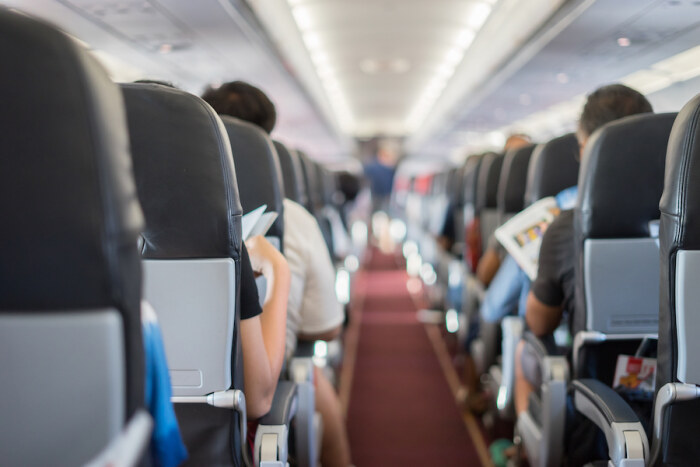Kurt Meyer writes a weekly column for the Nora Springs – Rockford Register, where this essay first appeared. He serves as chair of the executive committee (the equivalent of board chair) of Americans for Democratic Action, America’s most experienced liberal organization.
“Instructors demonstrated how to stand, move, and approach an attacker, as well as fight or defend themselves with their hands, elbows, palms, knees, feet, and shins. Some techniques are standard, like a punch to the face. Others are new, like raking an attacker’s face with your nails.”
Those sentences are not about a martial arts class or training for bodyguards. This was a newspaper article describing a voluntary, four-hour course available to flight attendants, which noted, may interest those
“looking for more tools to protect themselves from aggressive, out-of-control passengers. Flight attendants wince at the mention of gouging an attacker’s eyes. ‘Remember, this guy is attacking you,’ the air marshal said, encouraging the class to keep their warrior mind-set.”
So, this is what it’s come to? A warrior mind-set among airline employees? What ever happened to “fly the friendly skies”?
Let me quickly say in dealing with what are euphemistically called “unruly passengers,” I side with flight attendants, three-fourths of them women. In 2021, the Federal Aviation Administration (FAA) received almost 6,000 unruly-passenger reports, more than two-thirds mask-related. About 1,100 investigations last year of unruly passenger incidents is a whopping sixfold increase over 2020 and more than in the previous seven years combined. What’s going on here?
Nationwide, incivility and rudeness have increased gradually for years. In an extensive poll taken in February 2019 – one year before the COVID-19 pandemic – 93 percent of Americans thought uncivil behavior was increasing; 68 percent called this a major problem. The pandemic has only extended and expanded this social corrosion. One indication of this incivility is airline passengers who refuse to comply with mask requirements.
The FAA has had a zero-tolerance policy for more than a year; recently they doubled fines for violations. An even more assertive response may be required since violators are getting, ahem, more aggressive. A few computer clicks reveal repeated recent episodes of “passengers gone wild” (often aided by beverage) resulting in shouting, threatening, cursing, punching, and yes, attacking flight attendants. The very idea that zip ties and duct tape to constrain passengers are now standard airline emergency equipment is more than a bit alarming.
So, what can and should be done? Several ideas, not necessarily originating with me:
First: more air marshals, trained in de-escalating potentially explosive situations. Although raw numbers are classified, estimates suggest five percent of U.S. flights have an air marshal on board. Why not twenty percent within 18 months?
Second: names of unruly fliers added without hesitation to the “no fly” list, with airlines sharing lists among carriers, making it difficult for vexatious travelers to simply book another flight. Delta Airlines is currently advancing this idea, which is opposed by eight Republican senators – not yet including Iowa’s senators – who fear of a false equivalence between terrorists and those opposing mask mandates.
Third: a swift, more streamlined form of justice to adjudicate violations. Currently, a multilayered enforcement system oversees such matters, which can take years and involves airline employees, FAA inspectors, Transportation Department judges, local authorities, state and federal courts, FBI agents, blah, blah, blah. It gives me a headache just considering it all. Let’s simplify this process while retaining individuals’ rights, which, as you undoubtedly can tell, I’m not overly sympathetic toward right now.
Fourth: (big idea!) banning alcohol on flights… perhaps also in airports. I mean, what benefit might there be to say no booze on planes if passengers simply “top off” before boarding or bring “big gulp” beakers of hooch on board. Sadly, alcohol is a significant factor in many quickly escalating incidents.
Fifth: let’s all take a long, deep breath… airport and airline personnel, passengers, and everyone involved in this complex enterprise. All parties need to recalibrate our “jetiquette” with an additional measure of patience and restraint.
Bear in mind, it wasn’t too long ago when Iowans best travel options were horseback, covered wagon, and dugout canoe. We can get through this. Together.


1 Comment
Thank you, Kurt Meyer
One of my close relatives is a Delta flight attendant. She went through challenging extensive training. In terms of the percentage of applicants accepted, it’s harder to become a Delta flight attendant than to get into Harvard. She is a native speaker of both Japanese and English, which helped her get her job, and she does it very well.
And now I have to worry about some mask-opposing drunken person hauling off and punching her. The reforms suggested in this essay cannot come too soon.
PrairieFan Fri 25 Feb 9:24 PM